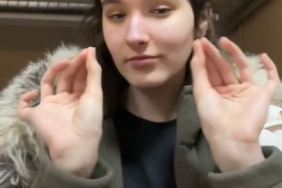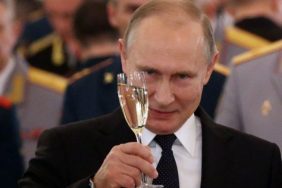Exiled for “malicious hooliganism with exceptional cynicism and extreme insolence” at the age of 21, Slava Mogutin was the last political dissident from the former Soviet Union. As an openly gay man living under a repressive regime, he was outspoken and unrepentant, calling out the hypocrisy and corruption of the government publicly. In 1994, Mogutin attempted to register officially the first same-sex marriage in Russia with his then-partner, American artist Robert Filippini. The attempt made headlines around the world, but only further fueled his persecution by the authorities. Forced to flee his country in 1995, he came to the United States and quickly blazed a trail as one of the most important contemporary artists of our time.
Also: Go Underground and Discover the Legend of “Diamond Dogs”
Ten years ago, Mogutin released his first monograph, Lost Boys (powerHouse Books), a powerful and provocative collection of portraits and landscapes taken in his native Russia. Intuitively combining porn, kink, and fashion into a seamless blend of intense sensuality and fearless sexuality, Mogutin’s work has helped to redefine the depiction of masculinity worldwide.

In celebration Artwall, in cooperation with Prague Pride, presents Lost Boys: From Russia With Love, now through September 30, 2016. The exhibition. Mogutin’s first solo show in the Czech Republic, is a large format outdoor installation that runs along the Letná wall, which originally served as a space for Communist propaganda. By appropriating this popular space for public art, Artwall strips away the formality of the gallery, destroying the elitist divide between art and life. With Lost Boys: From Russia With Love, Mogutin makes you look. He speaks with Crave about the work.
The photographs in Lost Boys were made back in 2000-2004. Please speak about the inspiration for this body of work. What are some of the ideas and themes you wanted to explore through photography?
Slava Mogutin: Lost Boys is a hybrid of visual poetry, personal diary and social anthropology, with different archetypes of masculinity as my subjects and inspiration. When I first had the opportunity to return to Russia several years after my exile, I saw the country in the throws of unprecedented economic and political corruption, with packs of stray dogs and homeless kids all over Moscow and St. Petersburg and the explosion of new alternative youth subcultures—a strike contrast with the countless uniformed military men and cadets who represented order and power. It was the early years of Putin’s rule, with the music counterculture, art and literary life and emerging gay community still enjoying relative freedoms offered by Putin’s predecessor, the first president of independent Russia and the notorious drunkard Boris Yeltsin. Looking back, I remember that time with the sense of nostalgia that is evident in most of the pictures in Lost Boys.

Over the past decade, so much has changed in terms of the public discourse and representations of male sexuality. Looking back at the impact of Lost Boys, how do you think your work has helped influence and shape the conversation?
I think there’re various reasons why this book still resonates with the art, fashion and fetish worlds alike. Truth to be told, I never took those pictures for vanity or any specific reason other than honest, sentimental and at times sexy documentation—the very special moments and people that I wanted to share with the world. I never planned to have all those images published under the same cover. The title was borrowed from my first solo show in New York, and there was way more material left behind. I’m certainly flattered that my work helped to shape the conversation about beauty and masculinity, tolerance and diversity, queer rebellion and acceptance in the 21st century. It’s an important conversation to have.

What I love about Lost Boys is the ways in which you comfortably, if not sexily, transgress taboos. I love that Artwall has taken such a big leap in turning these images into public art. How does it feel to see the work made public in such an extraordinary way?
It’s empowering to see my work so proudly and prominently displayed in the historic heart of Prague, a perfect intersection between the East and the West, the Communist past and the capitalist present. The place is also very symbolic, as my billboards are overlooking one of the most beautiful bridges and installed right below Letna Park where the world’s largest monument to Stalin used to stand. It was perhaps the darkest reminder of the Communist oppression and it had a tragic and sinister story behind. The sculptor of the monument committed suicide the day before its unveiling in 1955 and the monument itself was blown up with 800kg of explosives several years later, during the so-called “de-Stalinization period.” It’s emotional and symbolic to see these images being a part of the public domain and everyday life, as my art has come a full circle from the street to gallery and museum walls and then back to the street again. The pictures documenting post-Soviet Russia embraced by the Czech people as an act of reconciling with our shared past. I couldn’t be happier with the response I got in Prague!

The title of the show, “From Russia With Love,” is also a great backhand at Putin and his anti-gay policies. I admire that throughout your life, you’ve called out oppression, injustice, and bigotry so powerfully. Where does the strength and courage to speak truth to power come from—and where do you hope it to take you?
I rewatched From Russia With Love en route from New York to Prague. I think it’s one of the greatest cult classics of all times, despite all the misogyny and the Cold War antics representing the spirit of the early ‘60s. Coming from the other side of the Iron Curtain, I find it ironic that I can identify more with this brilliant camp movie than the grim Stalin statue that was destroyed around the same time. I think it’s important to remember your roots and don’t get stuck on any ideology, propaganda or brainwashing. I always wanted to use my creative powers in the rebellious way for the betterment of all. I believe artists and writers like us can create a dialogue, a revolution, a social shift that no career politicians can ever dream of. We’ve seen it with the Beat movement in the US.
We’ve seen it with Solzhenitsyn’s The Gulag Archipelago in the USSR. We’ve seen it with Vaclav Havel’s Velvet Revolution in Czech Republic. We’re yet to see it in today’s Russia. Evidently I have some work to do.

All photos: © Slava Mogutin.
Miss Rosen is a New York-based writer, curator, and brand strategist. There is nothing she adores so much as photography and books. A small part of her wishes she had a proper library, like in the game of Clue. Then she could blaze and write soliloquies to her in and out of print loves.








